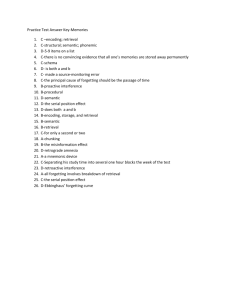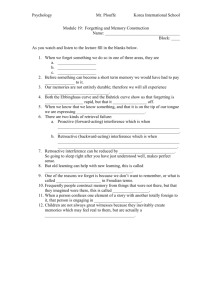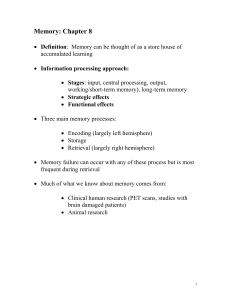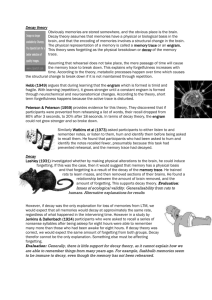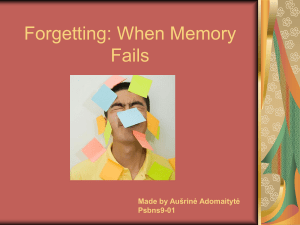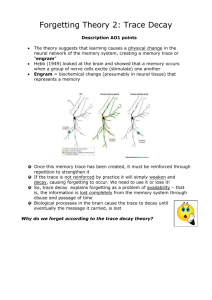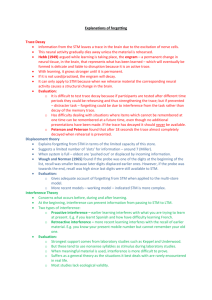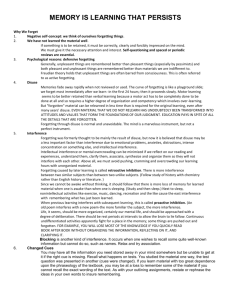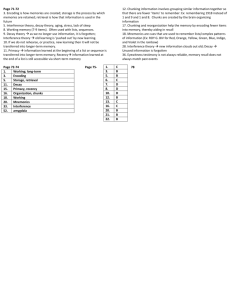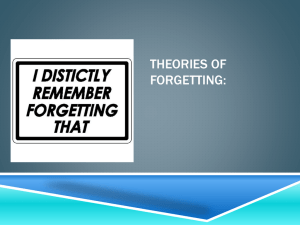Forgetting - Socialscientist.us
advertisement
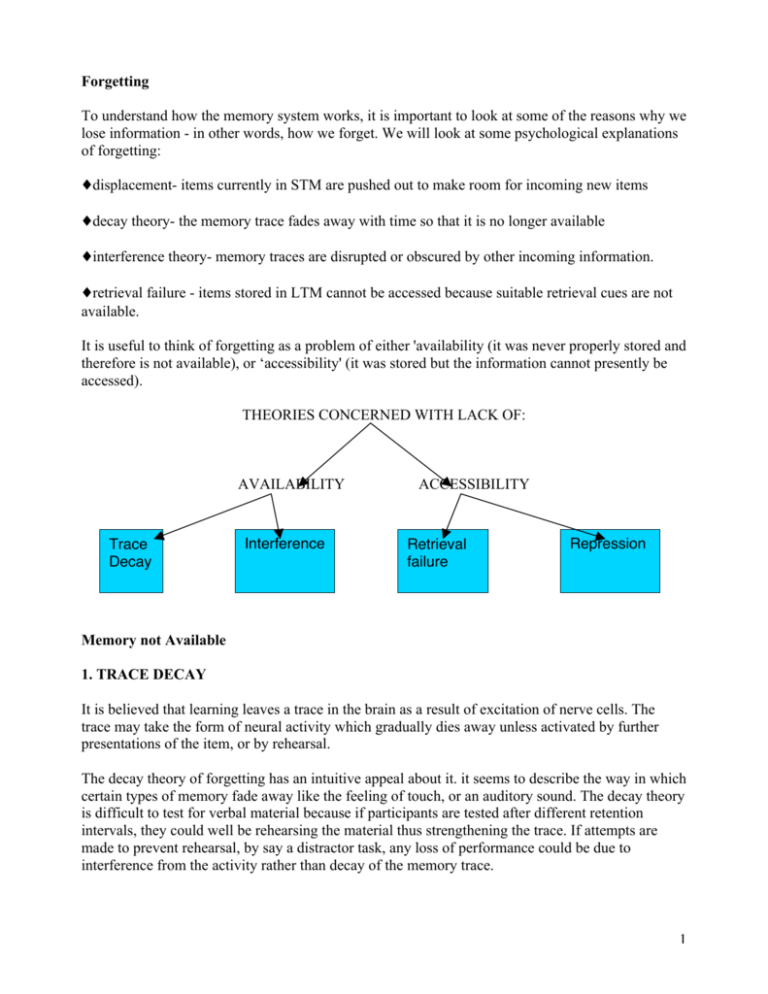
Forgetting To understand how the memory system works, it is important to look at some of the reasons why we lose information - in other words, how we forget. We will look at some psychological explanations of forgetting: ♦displacement- items currently in STM are pushed out to make room for incoming new items ♦decay theory- the memory trace fades away with time so that it is no longer available ♦interference theory- memory traces are disrupted or obscured by other incoming information. ♦retrieval failure - items stored in LTM cannot be accessed because suitable retrieval cues are not available. It is useful to think of forgetting as a problem of either 'availability (it was never properly stored and therefore is not available), or ‘accessibility' (it was stored but the information cannot presently be accessed). THEORIES CONCERNED WITH LACK OF: AVAILABILITY Trace Decay Interference ACCESSIBILITY Retrieval failure Repression Memory not Available 1. TRACE DECAY It is believed that learning leaves a trace in the brain as a result of excitation of nerve cells. The trace may take the form of neural activity which gradually dies away unless activated by further presentations of the item, or by rehearsal. The decay theory of forgetting has an intuitive appeal about it. it seems to describe the way in which certain types of memory fade away like the feeling of touch, or an auditory sound. The decay theory is difficult to test for verbal material because if participants are tested after different retention intervals, they could well be rehearsing the material thus strengthening the trace. If attempts are made to prevent rehearsal, by say a distractor task, any loss of performance could be due to interference from the activity rather than decay of the memory trace. 1 Jenkins & Dallenbach, 1924 pointed out that decay theory predicts a constant rate of forgetting irrespective of the activity undertaken in the interval. They tested this prediction by asking participants to learn lists if nonsense syllables and testing recall after various intervals of sleep or normal activity. Forgetting was most rapid for the normal activity group and this can be explained by interference theory, but not trace decay which should produce equal forgetting rates. There are problems with the Jenkins and Dallenbach procedure, one of which is ensuring participants fall asleep immediately. If they are awake they may rehearse the material and thus the items become resistant to decay. Waugh and Norman, 1965 investigated trace decay in short-term memory using a serial probe technique. They presented lists of 16 digits at a rate of 1 - 4 per second. The last digit, known as the probe, had occurred exactly once before in the list and the task was to recall the digit which had followed it. Waugh and Norman predicted participants would recall the digit more accurately if they were presented rapidly, as there would be less time between presentation and test, and thus less time for the trace to decay. In fact they found no relationship between speed of presentation and recall and this calls into question the validity of trace decay as the major source of forgetting on this task. They argued that forgetting is caused by the intervening items rather than the decay. Evaluation of Trace Decay 1. According to HEBB (1949) trace decay can only apply to short-term memory, as he believes repeated neural activity causes a structural neural change, which would seem to correspond to longterm memory. 2. Decay theory has difficulty dealing with situations where items which cannot be remembered at one time can be remembered as a future time even though no additional presentations have been made. 3. Solso, 1995 has concluded that there is no evidence that the major cause for forgetting from longterm memory is neurological decay. Memory not Available 2. Interference Theory of Forgetting Proactive Interference (PI) Keppel and Underwood, 1962, provided evidence that decay is not an adequate explanation for forgetting. In one experiment they tested serial recall of consonant trigrams (e.g. pjx) after 3, 9, 18 seconds of backward counting. The order of testing was balanced. On the first trial performance is nearly 100% even though some participants had 3 second interval, some 9 second and others 18 seconds. On the second and third trials performance falls steadily as the interval increases. If decay is the sole explanation for forgetting performance should fall as the interval increases on the first trial as well as subsequent trials. One explanation for the inferior performance on later trials is that learning the first trigram INTERFERES with learning the second, and learning the first 2 interferes with the third. The first item learned is remember perfectly as there is no preceding items to interfere with it. This type of 2 interference is known as PROACTIVE INTERFERENCE because it appears to act forwards earlier learning interfering with later learning. Retroactive Interference (RI) Whereas early learning is said to interfere with later learning in proactive interference, in retroactive interference the intervening activity is said to interfere with remembering items learned prior to it. The basic experimental technique used for the assessment of interference is: X = learn nothing or learn materials which will not interfere Group Stage One Interval One Stage Two Interval Two Stage Three Proactive Interference Experimental Control Learn A X Learn B Learn B Test B Test B Retroactive Interference Experimental Control Learn A Learn A Learn B X Test A Test A The difference between the 2 groups at stage 3 give a measure of pi and ri. EXPLANATIONS FOR INTERFERENCE McGeoch, 1942 proposed that when participants have been required to learn two responses to the same stimulus there is competition between them at recall. The amount of competition depends on the extent to which it has been learned - if B is well learned at Stage 2 there will be little PI but RI will INCREASE because B will be able to compete successfully with the A responses when these are required at Stage 3. Melton & Lewin, on the other hand, have proposed that learning the B responses to the stimulus led to UNLEARNING of the A responses so they actually became unavailable. EVALUATION 1. Interference theory suffers as a general theory of forgetting because the situations it best deals with are rarely encountered in everyday life. We do not often have to learn similar verbal responses to the same stimuli within a short period of time. Experimental studies of interference lack ecological validity. 2. Solso, 1995 has pointed out that studies of interference have largely involved Episodic Memory and whereas this demonstrates that episodic memory may be subject to interference, Semantic Memory is likely to be more resistant. 3 A Problem of Accessibility 1. Repressive Forgetting According to Freud (1856-1939) some experiences are so painful that if they were allowed to enter consciousness they would produce overwhelming anxiety. Instead, these experiences are repressed and stored in the unconscious, thereby becoming inaccessible. Repression is the ultimate failure to access memories because forgotten memories are actively blocked. Even when a person seems to be trying hard to recall a particular event, they will stop or change the subject when they come near to recalling the original, painful memory. Repressive Forgetting (sometimes call motivated forgetting) proposes: 1. The original experience HAS been encoded and stored by the individual, and recall can occur usually through the use of techniques like 'free association'. However, recall cannot occur as a result of questioning or through conscious efforts to try to remember. 2. Repressed experiences always involve deep anxiety and this anxiety is increased because repression is both active and continuous, involving constant and exhausting expenditure of energy. Sometimes the repressed event breaks through in a disguised form in, for example dreams or parapraxes. Exactly what is repressed varies from individual to individual, but always some unpleasant emotional reaction (fear, guilt, shame) is aroused when the event is recalled. The memory can only be retrieved when the emotional tension associated with it is released. This is call ABREACTION (also known as 'catharsis') and is usually achieved during therapy. Abreaction does not eliminate the cause of the conflict, but it enables the repressed feelings and experiences to be explored. EVALUATION 1. The notion of actively blocking the memories we are trying to access is qualitatively different from any other explanation of forgetting and it is a phenomenon that would be useful to investigate in the laboratory. However, to do this the experimenter would need to have the participant experience something very traumatic and this is not feasible for ethical reasons. Some studies have involved exposing participants to mildly upsetting experiences and there has been some support for the repression hypothesis (Erdelyi, 1985; Baddeley, 1990). 2. Tests of emotional inhibition have offered some support for Freud's theory. Levinger and Clark, 1961 investigated retention of associations to negatively-charged words and found participants were particularly poor at remembering associations to emotionally-charged words. This is exactly what the repression hypothesis would predict. (A fuller discussion of the above study can be found in Gross p3 10). A Problem of Accessibility 2. Retrieval Failure 4 The information available in memory is not accessible if the correct retrieval rules are not followed. Tulving & Pearlstone, 1966 showed that provision of the category name, supplied with the word at presentation, was effective in bringing about recall of items which could not be recalled without it. Tulving (1974) proposed that a large amount of forgetting is entirely due to retrieval failure. Retrieval depends on cues (hence cue-dependent forgetting). Cues can be a variety of things: Categories; Context; Physical State; Underwater etc. E.g a teacher giving clues when trying to illicit an answer from students. If the state or context of people at the time of acquisition of information matches the state/context when asked to recall, then research indicates recall is improved. For example: Bower 1981 manipulated the mood of his participants by hypnosis and showed clearly how much the match or mismatch at the time of learning and recall had a strong effect on the accessibility of memories. A graph showing the effects of Mood on Memory (Bower, 1981) % of words recalled 100 90 Learned whilst happy. 80 70 60 Learned whilst sad 50 40 SAD HAPPY Mood during recall Zechmeister & Nyberg (1982) found that participants could imaginatively recreate the learning conditions and thereby reduce the effect of state-dependent forgetting. Godden and Baddeley, 1975 demonstrated context dependency with the learning of lists of unrelated words by deep-sea divers. Items learned on land were difflcult to recall in the underwater environment. Similarly, words heard underwater may be forgotten once on dry land. Godden & Baddeley, 1980 found no such effect on recognition, and concluded that this effect applies to recall only. 5 EVALUATION 1. The Bower, 1981 study manipulating mood under hypnosis has not been replicated. 2. Often studies have been done under extreme conditions (deep-sea divers) or where the states are very different (eg hypnotic manipulation of extreme mood swings, alcohol and drug use), whereas in real life we often have to recall things under similar conditions. For example, during examinations we recall in a quiet environment and presumably that is the type of environment people study in. Some of the studies in this area, then, could be said to lack ecological validity, and indeed with less dramatic changes in environment only slight differences in recall are produced (Baddeley, 1995). 6
